By Tracy Record
White Center Now editor
At the start of this month’s North Highline Unincorporated Area Council meeting, president Liz Giba said she was expecting it to be a less rambunctious meeting than May (WCN coverage here).
Eventually it was, but not after a somewhat chaotic start.
Though nothing related to it was on the agenda, the Tim’s Tavern outdoor-music situation – which has come before NHUAC off and on for years – arose, somewhat indirectly. A few attendees demanded an explanation of who NHUAC is, what’s their purpose, how are board members chosen, often echoing language that Tim’s has used recently in a social-media campaign, “small unelected group.” (The board used to be elected by the public, in fact, back when King County government formally supported the UACs, which ended more than a decade ago, as the county switched to a focus on “community service areas.” Some UACs, like this one, carried on as unofficial volunteer-powered community coalitions.)
Giba had invited her fellow board members to make statements as the meeting started. Amelia Cullinan wanted to explain that NHUAC is a board of volunteers that is meant to be a liaison with King County. “There’s a lot of deep history from the community in this room … everything NHUAC is about is about true community ..” She acknowledged that some meetings have been poorly attended (and some well-attended, other board members countered) and said the group needs to get the word out more about what it does. “I think we should look at …what the community wants overall.” She eventually addressed the ongoing controversy over outdoor music and said NHUAC is there to help people, depending on what they want or don’t want. “How we can function as a resource, I think there’s a lot we can do, be more of a hub for the community.”
What’s their website? asked an audience member. nhuac.org
NHUAC vice president Barbara Dobkin noted that the county formed the councils back in 1996 and supported them for some years. “We feel this is important because we don’t have city government. We don’t make rules, we don’t legislate …”
An attendee pressed the point of wanting to know how board members were selected. They explained, “We interview folks, we ask what their intentions are.”
“So the board decides who’s on the board?” somebody asked. (Basically, yes, after applicants come forward – it’s not an “invitation only” situation.)
Other attendees asked about bylaws, term limits, other things shaping the board composition; the tone was generally not friendly curiosity. Someone in the audience tried to clarify that NHUAC worked to help ensure access to King County reps and info. Attendees said they’re just trying to understand what’s going on here, because “there’s a situation and someone on your board started it. … We don’t understand what’s going on. … It’s gotten pretty messy where it’s been.” The word “transparency” was heard a lot.
A man in the audience said “There’s a fight happening now …” “The fight is between the county and Tim’s,” the board tried to clarify.
The people in the audience started stridenly demanding that NHUAC post bylaws.
Yet another attendee suggested that King County is not reaching out well enough to White Center’s diverse demographic groups, and also that King County Sheriff’s Deputies in 2018 were described in an audit as not well trained in the noise ordinance.
It’s hard to find out online where the unincorporated areas are, someone said.
Dobkin pointed out that there’s a Local Services newsletter monthly that recounts those
The woman in the back kept shouting about transparency. Eventually, it all calmed down somewhat, and the NHUAC board moved on into their agenda, which, as we noted, .
LIQUOR AND CANNABIS BOARD: Officer Eric Thomas was the first guest. He said his assigned area has recently changed – he’s now also covering all of Tukwila. He’s one of four officers “on the south team,” from the King/Pierce Counties boundary to SW Roxbury. There’s also the South Seattle team and the North Seattle team – each with five officers and a lieutenant. “Little known we also have a unit called FDA which works for the U.S. Food and Drug Administration,” doing some compliance checks.
He addressed some specific businesses – Smoke Town, for example, had a 180-day tobacco suspension after failing a certain number of checks. They’re currently pursuing a discontinuance of the license; the owner hasn’t responded to attempts at contact. “They will not have a liquor license or a tobacco license.” Also, Lucky Liquor/Cannabis across 16th from the Southgate Rink Bar.”That owner voluntarily closed his business to move his license to another location.” Cocina Cocera opened recently, with South American food.
Lots of discussion ensued about businesses past, present, and future. Thomas said they don’t generally issue licenses more than 90 days before the business opens. He is supposed to do a “new licensee” inspection within 60 days of a license being granted, so it’s frustrating when the timeline stretches out.
Thomas said he loves working with new businesses and answering questions. In general, he explained, a big part of his job is education.
COUNTY COUNCILMEMBER MOSQUEDA: “I know I’ll see many of you at White Center Pride this weekend!” she exclaimed. She also said she and her daughter had dinner at Cocina Cocera and were wowed.
Her main goal – improving the community’s health. She mentioned the King County Sheriff’s Office representation in the area and says that communities “that may have been harmed in the. past” are feeling listened to. She said the job fair and basketball tournament at Steve Cox Memorial Park earlier in the week brought “an incredible sense of community.” She also said that she wants people to know that District 8 represents three unincorporated areas – North Highline, Vashon, and South Park’s “sliver by the river.” She talked about the Parks Levy “at a time when the federal government is cutting” those types of services – but she wants specific investments for this area, so she circulated a handout that listed various projects earmarked for part of the Parks Levy funding. A splashpark at Steve Cox Memorial Park is on the list. A covered play area for kids, too.
She also brought a one-sheet about North Highline roads in need of help, saying the county council, sitting as the Transportation Benefit District, heard a presentation about the county’s failing roads. The conversation began before COVID and then changed – but another conversation is coming up in less than two months, she said.
She also offered gratitude for feedback – like on the recent comp plan. She said a constituent expressed concern about new bigbox stores. North Highline doesn’t need those, she agreed. She also brought up stormwater infrastructure, which she said is needed to support an inreasing population. but she also expressed concern about empty houses awaiting Air BnB usage during the World Cup. “What we can’t do is having working families’ homes held empty,” so they’re looking at ways that they might address that in the ways that other counties in the state have.
Mosqueda also said she’s been looking into derelict properties – homes and businesses – and mentioned the Seattle Restored program. She would like to see something like that in White Center.
Other topics that came up – beer and wine sales are now allowed in the stands at DubSea Fish Sticks games.
Back to the Parks Levy, what about public art? Yes, there’s a policy directive for that, including $2 million for an art initiative including a pocket park in downtown White Center.”
Grants for public art? “There are tons of grants for public art,” she said.
Other questions ranged from “what does councilmanic mean?” (answer: the council gets to decide) to more elaboration on trees and lighting that are in the Parks Levy.
A question finally came up about the Tim’s Tavern live-music situation. “How can we help Tim’s?” asked an attendee. Mosqueda said the planning department is working on it. She added that White Center’s thriving arts scene is important, and she’s hoping the whole situation can find a “win-win solution.” She added to the questioner, “We hear you.” However, there is no proposal to change zoning, she clarified to us in a conversation at a West Seattle event two nights later.
WHAT’S NEXT: NHUAC will resume meetings in the fall.

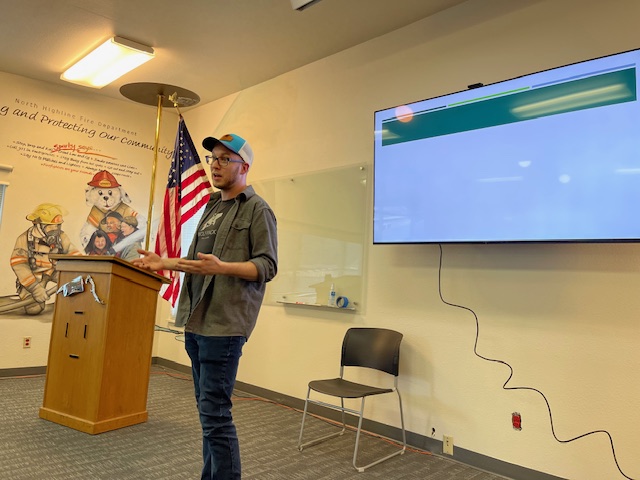


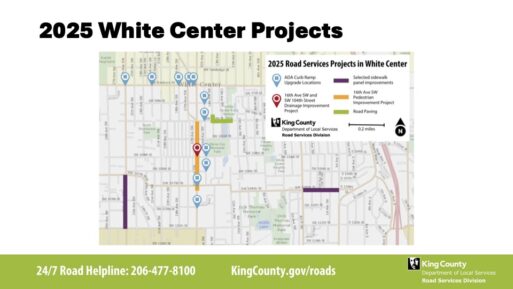
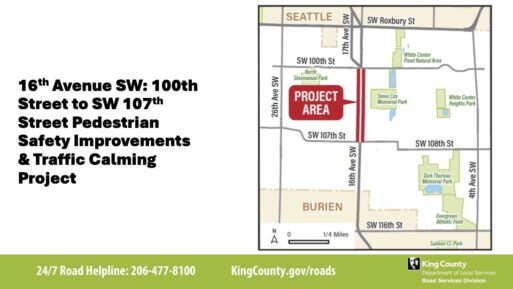
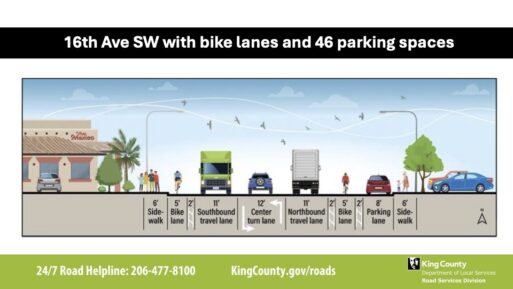
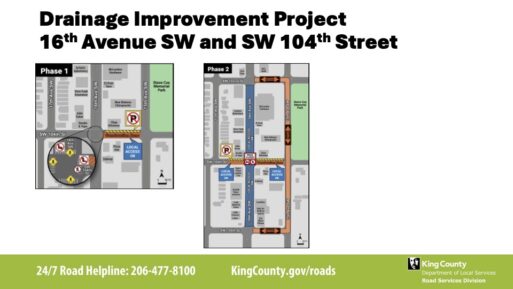
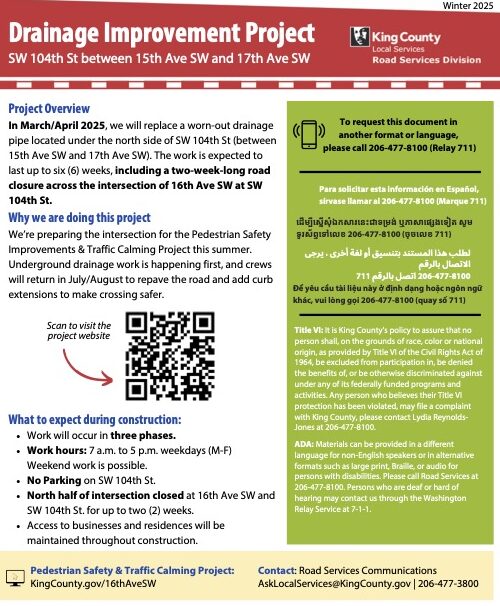
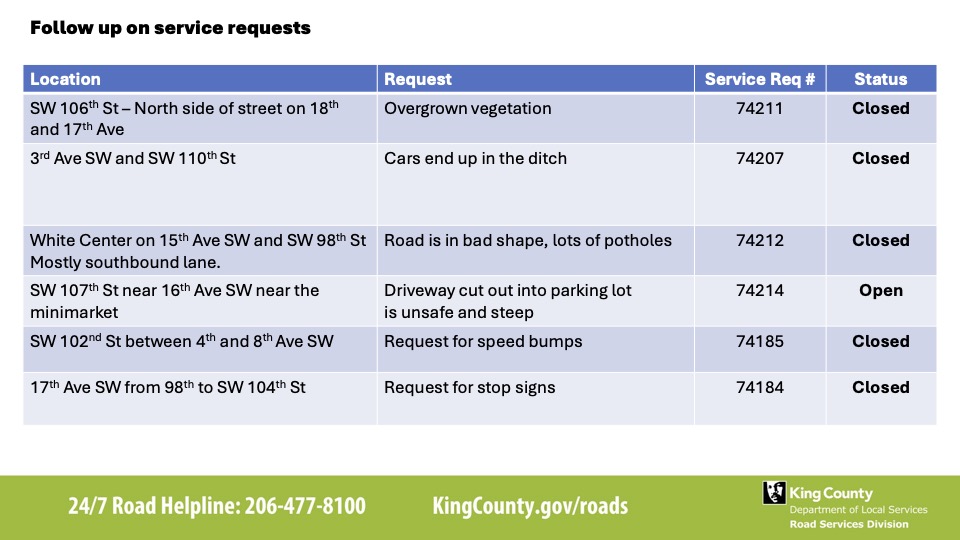

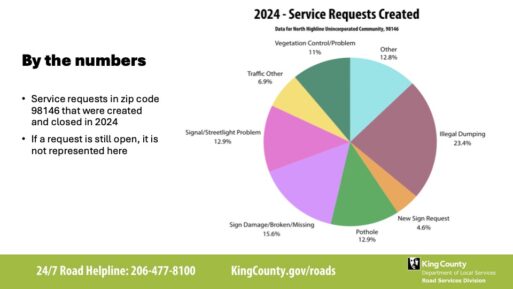
 By Jason Grotelueschen
By Jason Grotelueschen





